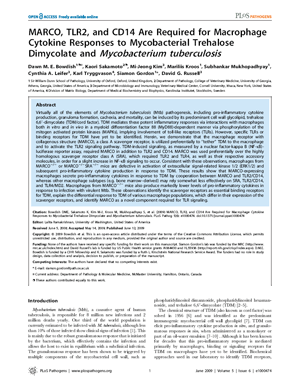Dawn, in collaboration with Dr. Kaori Sakamoto (University of Georgia) and Dr. David Russell (Cornell University), has demonstrated that the scavenger receptor MARCO is a receptor for Mycobacterium tuberculosis (Mtb). More specifically MARCO recognizes the major immunogenic mycobacterial lipid of Mtb, trehalose dimycolate (TDM).
Dr. David Russell (Cornell University), has demonstrated that the scavenger receptor MARCO is a receptor for Mycobacterium tuberculosis (Mtb). More specifically MARCO recognizes the major immunogenic mycobacterial lipid of Mtb, trehalose dimycolate (TDM).
Interestingly TDM was discovered to be a major immunogenic component of Mtb in the 50’s but attempts to find the macrophage receptor have been unsuccessful. This could well be because the scavenger receptors tend to be “sticky” (hence the nickname ‘molecular flypaper’) and bind with high avidity rather than affinity and for this reason many conventional assays (e.g. pull-down) are not effective for finding ligands. Another interesting implication of this work is that MARCO is not expressed on all macrophages (for example it is on resident peritoneal macrophagesand alveolar but not bone marrow derived macrophages or cell lines) so this may explain why some macrophages are highly responsive to TDM while others are not.
Most importantly, however, this discovery has important implications for understanding Mtb pathogenesis, specifically with regard to how macrophages initiate (or fail to initiate) a pro-inflammatory response. TDM and deriviatives are potent adjuvants that show potential for eliciting strong and long-lasting immune responses and these data indicate that TDM mediated responses are due to both binding and signalling interactions with macrophages. Read the whole paper here.

